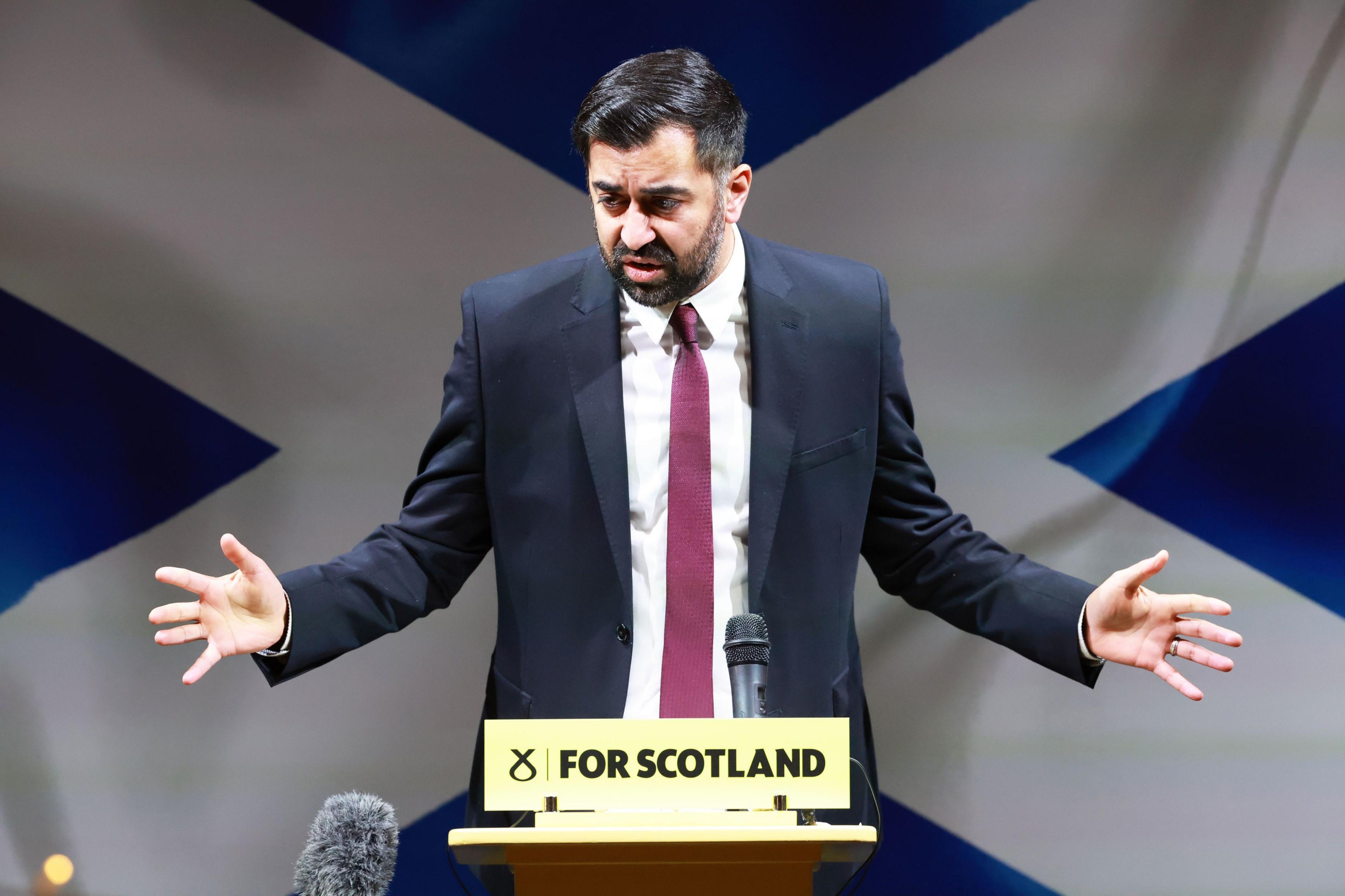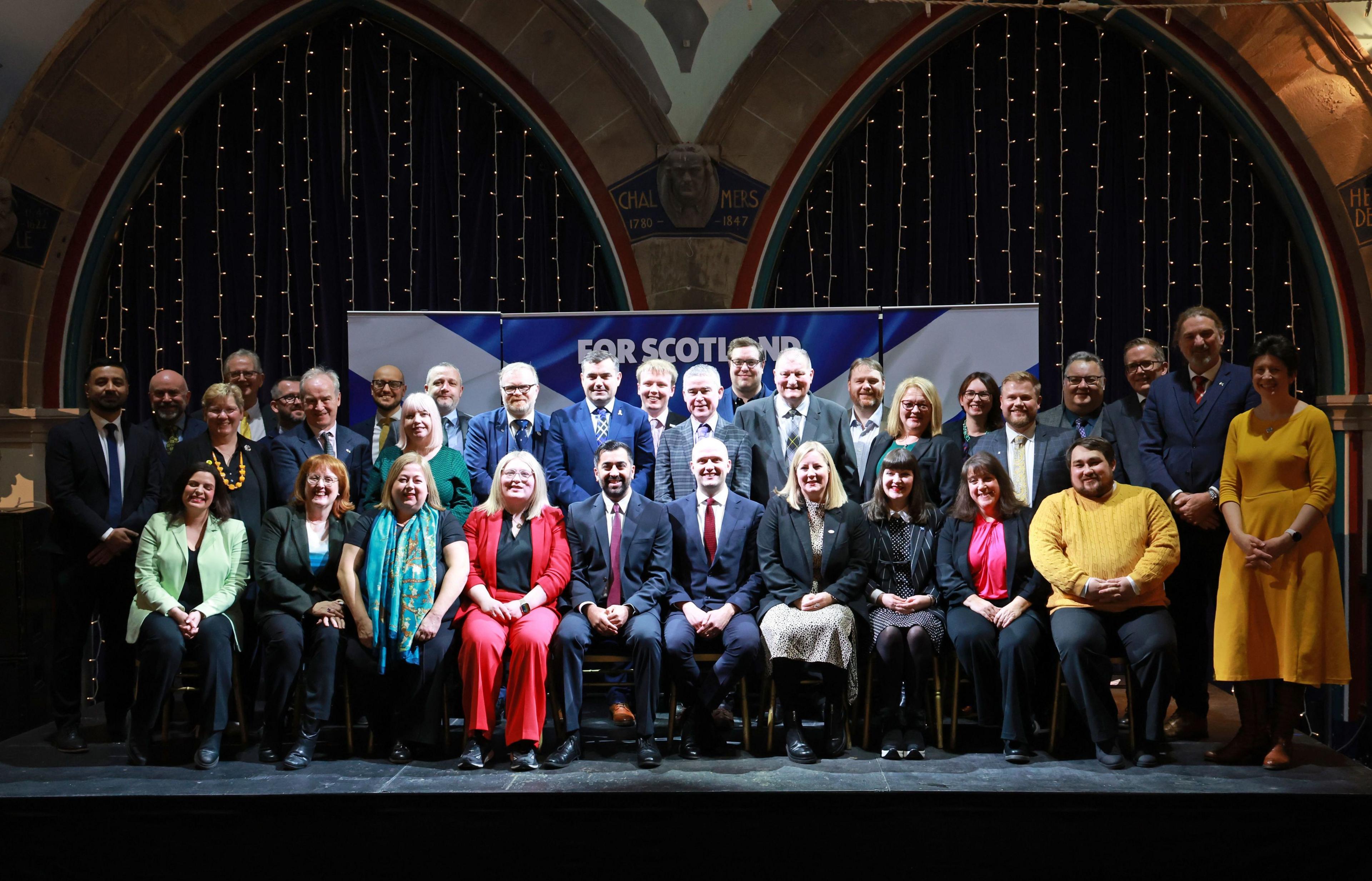A shift in tone as the SNP gears up for election

The first minister outlined his message for the upcoming general election during a speech in Glasgow
- Published
When Rishi Sunak announced it was his “working assumption” that there would be a general election in the second half of this year, he effectively fired the campaign starting gun.
And Humza Yousaf has wasted no time in spelling out the message he wants to hammer home in the months ahead.
He treated activists and sitting MPs and MSPs to a speech in Glasgow on Friday.
But – given that he can already rely on their votes – they weren’t the intended audience.
The best and worst year of Humza Yousaf's career
- Published31 December 2023
Politicians primed for change in the year ahead
- Published5 January 2024
Ex-adviser: SNP faces biggest challenge in 20 years
- Published1 January 2024
The SNP leader was pitching to those in Scotland who back the idea of independence, but are flirting with voting Labour to get Rishi Sunak out of Number 10.
He essentially told them that they can have their cake and eat it at the next general election.
His logic goes like this: Sir Keir Starmer has it in the bag. He will be Prime Minister. Labour’s UK-wide lead is so commanding that Scottish seats won’t swing the election.
Therefore, he argues, independence supporters should back the SNP to keep independence on the agenda.
Humza Yousaf wants to reassure them that they can have everything they want – an end to Conservative government, whilst keeping the prospect of independence alive and well.
The independence part of that message is nothing new. Though there does appear to be a slight change in tone.
There was a stark column from the SNP MP Tommy Sheppard in recent days. Writing in the Sunday National, he warned “if the SNP lose the election in Scotland, the debate on independence stops”.
It appears Humza Yousaf may have been reading at the weekend, because he seems to have adopted elements of this message.
Speaking to Good Morning Scotland, he said that a big Labour vote in Scotland would take the cause of independence “backwards”.

SNP members at Friday's event, where the first minister said a lack of SNP MPs won't just hurt the party but the wider independence movement
I put it to Humza Yousaf that it sounds like he’s sending a warning to independence supporters. He insisted he isn’t.
But he is keen to stress that he believes a lack of SNP MPs won’t just hurt his party, but the wider independence movement.
Back at party conference last October, the first minister was keen to talk up the opportunities of SNP success for those who back independence.
But it feels like the new year has marked a shift to talking about the pitfalls of an underwhelming performance.
He told me any independence supporter “must vote for what you believe in”. In his mind, that’s a vote for the SNP.
It’s important to note that other pro-independence parties, such as the Greens and Alba, are available.
There’s logic behind his approach. Polls suggest the cause of independence is more popular than the SNP. Humza Yousaf believes tying the two together can improve his party’s chances.
Though there are still those who question the specifics on how a large number of SNP MPs shifts the dial on independence in the years ahead.
Campaign message settled
One party figure I spoke to was happy to see the party settle on a more straightforward campaign message.
But they were also concerned that some voters unhappy with the SNP/Green government’s performance in Scotland might look to give the party a bloody nose at election time, even if they back independence.
This is a theory shared by figures in Scottish Labour.
They think that many Scots are underwhelmed by the day-to-day running of the country, and will look to punish the SNP the next time they go to the polls (even if it’s a vote for Westminster, not Holyrood).
Scottish Labour also argue that electing their candidates gives Scottish MPs the chance to sit at the heart of the UK government.
The Scottish Conservatives will be content with the ground on which Humza Yousaf hopes to fight the forthcoming election.
If he wants to talk about independence, they’re more than happy to play ball and put forward the opposing side of the argument.
Elections soak up a lot of a party leader’s time and energy. And Humza Yousaf already has plenty on his plate.
He’s responsible for day-to-day government in Scotland. And SNP infighting is more public than at any time in recent political memory.
But at least one of his jobs seems to be done – he’s settled on a campaign message.
As ever, the key question is ‘will it work?’
It’s easy to see the rationality behind the approach Humza Yousaf is taking.
But you’re a brave person if you’re willing to predict the outcome of an election that may yet be the best part of a year away.